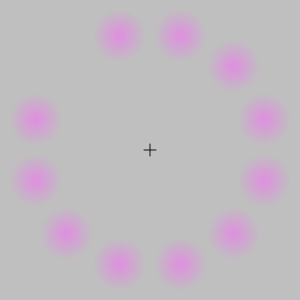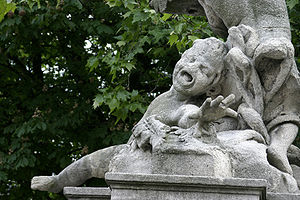Originally I am user:Civil Engineer III, but I forgot my password and can't get back in. So I switched to here on 20 March 2013.
Member since 27 February 2006.
Userbox
|
Barnstar

|
The Working Man's Barnstar
For tireless copyediting. T e ke 03:38, 24 May 2006 (UTC) |

|
The Cleanup Barnstar | |
| I hearby award you this barnstar of cleanup for your untiring and fine work on Oregon Trail. — EncMstr ( talk) 20:26, 12 November 2009 (UTC) |

|
The Editor's Barnstar | |
| For your terrific work on Amsterdam, I award you this barnstar. Well done! Anna Frodesiak ( talk) 04:58, 8 January 2010 (UTC) |
Things that I can't help but change when I peruse an article:
- due to
- a number of...
- it is important to note that... or variations thereof
Things that are bothersome, and I will change if I have the time:
- Commas. If it's a compound sentence, it needs a comma before the and or but. If the phrase after the conjunction cannot be a complete sentence on its own, no comma.
| From [1]: |
| QUESTION
How do you know when to use "Due to" as opposed to "Because of"? RESPONSE Some grammarians would prefer that we never use "due to" at all, but the phrase has some useful and acceptable applications, as Burchfield points out: * (payable to) "Pay Caesar what is due to Caesar." * (likely to) "It's due to rain this afternoon." * (properly owed to) "Much of what we own is due to my wife's investment decisions." * (following "to be") "His obesity is due to his daily diet of butterscotch sundaes." Burchfield then points out that when "due to" is used to create a prepositional phrase in a verbless clause, many grammarians will object. * "Due mainly to the engineers' incompetence, the roof began to sag dangerously." * "Due to the efforts of the English faculty, students' scores writing have begun to rise." Burchfield concludes that this use of due to seems to be forming "part of the natural language of the twenty-first century." The phrase "due to the fact that" can often be replaced, to good effect, with "because." Authority: The New Fowler's Modern English Usage edited by R.W. Burchfield. Clarendon Press: Oxford, England. 1996. |
Useful stuff
Could we but get a good regular army we should soon clear the continent of these invaders.
- https://styleguide.militaryonesource.mil/terms/a
- Wikipedia:Manual of Style/Layout
- Wikipedia:Manual of Style (dates and numbers)
- Template:Section link
- Wikipedia:WikiProject Countries
- Italics: The titles of works that stand by themselves, such as books or newspapers: "There was a performance of Beethoven's Ode to Joy." Works that appear within larger works, such as short stories, poems, or newspaper articles, are not italicized, but merely set off in quotation marks.
- 47 Rules for Writers
- Category:Articles that may be too long



Originally I am user:Civil Engineer III, but I forgot my password and can't get back in. So I switched to here on 20 March 2013.
Member since 27 February 2006.
Userbox
|
Barnstar

|
The Working Man's Barnstar
For tireless copyediting. T e ke 03:38, 24 May 2006 (UTC) |

|
The Cleanup Barnstar | |
| I hearby award you this barnstar of cleanup for your untiring and fine work on Oregon Trail. — EncMstr ( talk) 20:26, 12 November 2009 (UTC) |

|
The Editor's Barnstar | |
| For your terrific work on Amsterdam, I award you this barnstar. Well done! Anna Frodesiak ( talk) 04:58, 8 January 2010 (UTC) |
Things that I can't help but change when I peruse an article:
- due to
- a number of...
- it is important to note that... or variations thereof
Things that are bothersome, and I will change if I have the time:
- Commas. If it's a compound sentence, it needs a comma before the and or but. If the phrase after the conjunction cannot be a complete sentence on its own, no comma.
| From [1]: |
| QUESTION
How do you know when to use "Due to" as opposed to "Because of"? RESPONSE Some grammarians would prefer that we never use "due to" at all, but the phrase has some useful and acceptable applications, as Burchfield points out: * (payable to) "Pay Caesar what is due to Caesar." * (likely to) "It's due to rain this afternoon." * (properly owed to) "Much of what we own is due to my wife's investment decisions." * (following "to be") "His obesity is due to his daily diet of butterscotch sundaes." Burchfield then points out that when "due to" is used to create a prepositional phrase in a verbless clause, many grammarians will object. * "Due mainly to the engineers' incompetence, the roof began to sag dangerously." * "Due to the efforts of the English faculty, students' scores writing have begun to rise." Burchfield concludes that this use of due to seems to be forming "part of the natural language of the twenty-first century." The phrase "due to the fact that" can often be replaced, to good effect, with "because." Authority: The New Fowler's Modern English Usage edited by R.W. Burchfield. Clarendon Press: Oxford, England. 1996. |
Useful stuff
Could we but get a good regular army we should soon clear the continent of these invaders.
- https://styleguide.militaryonesource.mil/terms/a
- Wikipedia:Manual of Style/Layout
- Wikipedia:Manual of Style (dates and numbers)
- Template:Section link
- Wikipedia:WikiProject Countries
- Italics: The titles of works that stand by themselves, such as books or newspapers: "There was a performance of Beethoven's Ode to Joy." Works that appear within larger works, such as short stories, poems, or newspaper articles, are not italicized, but merely set off in quotation marks.
- 47 Rules for Writers
- Category:Articles that may be too long



